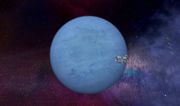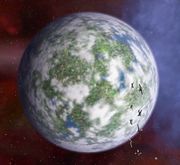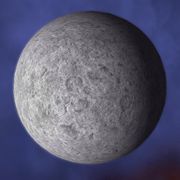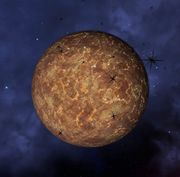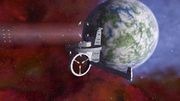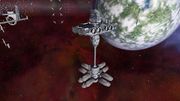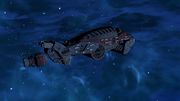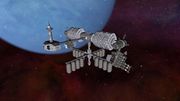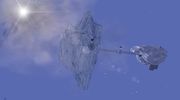|
|
| Line 107: |
Line 107: |
| | |style="vertical-align: top;"| | | |style="vertical-align: top;"| |
| | ===Planet Carlisle=== | | ===Planet Carlisle=== |
| − | : <span style="color:red;">>>>RESTRICTED<<<</span><br style="margin-bottom: 6px;"/>From orbit, planet Carlisle looks invitingly hospitable with deep oceans and vast continents, but in reality it is a tropical nightmare. Temperatures at the equator never drop below 60 Celsius. The oceans, however, remain a pleasant 26C in temperature, even quite far to the north and south. The lush greenery seen from orbit turns into dense, humid jungles and rain forest upon closer inspection, and there are several native creatures that consider humans to be good eating. The planet has significant deposits of aluminium, titanium and gold, and radium has been detected, although no mining operations have as yet been established planet-side.<br style="margin-bottom: 6px;"/>For many years, scientists from Cambridge have been studying a particularly virulent form of bacteria native to the planet that has proven to successfully infect and kill humans. The bacterium quickly spreads throughout the body and dissolves every internal organ within a matter of hours. This has of course prevented the colonization of the planet, although Cryer researchers onboard Cambridge Research Station say they have created a protein that will target and eliminate the bacterium planet-wide, thus hopefully paving the way for Carlisle's colonization within the near future. | + | : <span style="color:red;">>>>RESTRICTED<<<</span> |
| | + | |
| | + | : From orbit, planet Carlisle looks invitingly hospitable with deep oceans and vast continents, but in reality it is a tropical nightmare. Temperatures at the equator never drop below 60 Celsius. The oceans, however, remain a pleasant 26C in temperature, even quite far to the north and south. The lush greenery seen from orbit turns into dense, humid jungles and rain forest upon closer inspection, and there are several native creatures that consider humans to be good eating. The planet has significant deposits of aluminium, titanium and gold, and radium has been detected, although no mining operations have as yet been established planet-side. |
| | + | |
| | + | : For many years, scientists from Cambridge have been studying a particularly virulent form of bacteria native to the planet that has proven to successfully infect and kill humans. The bacterium quickly spreads throughout the body and dissolves every internal organ within a matter of hours. This has of course prevented the colonization of the planet, although Cryer researchers onboard Cambridge Research Station say they have created a protein that will target and eliminate the bacterium planet-wide, thus hopefully paving the way for Carlisle's colonization within the near future. |
| | <div style="font-size: 11px"> | | <div style="font-size: 11px"> |
| | :: <b>Location:</b> C/3 | | :: <b>Location:</b> C/3 |
Article possibly outdated (v4.86
)This article has not been verified to be up to date for the latest version of the Discovery mod. The last edit was made on 17.12.2012 (
DD/MM/YYYY). You may help by
updating it, often by using the
code generator.
Newcastle is a system controlled by Bretonia, with a connection to Leeds being to only jump gate within the system. The system generates a considerable amount of traffic due to the presence of the Lancaster Trade Center, as well as various mining efforts by the IMG. Recently, Planet Carlisle has become the focus of a joint effort by Planetform, Inc. and the Cambridge Reaseach Institute to rid the planet of dangerous bacteria in order to pave the way for future colonization. This has made the Newcastle system the target of the Gaian terrorist group whom, in addition to the Mollies and the Outcasts, make up the majority of the unlawful forces within the system. Rumors also exist of a large extra-terrestrial complex on the outskirts of the system, although the Bretonia Armed Forces continues to assure people that such a complex does not exist, and any alien ruins that are found are to be avoided at all costs by civilians.
System Overview
|
Astronomical Bodies
Stellar Objects
- Planet Hartlepool
- Planet Carlisle
- Ashington
- Planet Middlesbrough
- Planet Darlington
- Galloway Ice Cloud
- Northumberland Ice Cloud
- Barrier Nebula (multiple)
- Barrier Field
- Ancient Minefield (multiple)
- Barrier Ice Field
- Yorkshire Debris Field
|
Industrial Development
|
Faction Presence
Lawful Factions
Corporations & Guilds
Unlawful Factions
|
Jump Gates and Holes
Planetary Bodies
Planet Hartlepool
- A large, blue gas giant in the Newcastle system, Hartlepool has significant oxygen and hydrogen reserves in the atmosphere, along with small quantities of tritium and helium. The IMG have several gas miners in the atmosphere to harvest the various gases, and they are processed onboard the orbiting IMG refinery of South Shields.
|
|
Planet Carlisle
- >>>RESTRICTED<<<
- From orbit, planet Carlisle looks invitingly hospitable with deep oceans and vast continents, but in reality it is a tropical nightmare. Temperatures at the equator never drop below 60 Celsius. The oceans, however, remain a pleasant 26C in temperature, even quite far to the north and south. The lush greenery seen from orbit turns into dense, humid jungles and rain forest upon closer inspection, and there are several native creatures that consider humans to be good eating. The planet has significant deposits of aluminium, titanium and gold, and radium has been detected, although no mining operations have as yet been established planet-side.
- For many years, scientists from Cambridge have been studying a particularly virulent form of bacteria native to the planet that has proven to successfully infect and kill humans. The bacterium quickly spreads throughout the body and dissolves every internal organ within a matter of hours. This has of course prevented the colonization of the planet, although Cryer researchers onboard Cambridge Research Station say they have created a protein that will target and eliminate the bacterium planet-wide, thus hopefully paving the way for Carlisle's colonization within the near future.
- Location: C/3
- Diameter: 12,642 km
- Mass: 6,11 x 10e24 kg
- Terrain: Terrestrial
- Temperature: -8?C to 53?C
- Escape Velocity: 11.15 km/sec
|
|
Ashington
- A small, pock marked moon of the planet Carlisle, Ashington has reasonable amounts of gold deposits located near its south pole, but besides the small automated mining installations placed there by the BMM, there has been no interest in the planetoid whatsoever.
|
|
Planet Middlesbrough
- A hot, arid planet with no atmosphere, Middlesbrough nevertheless has significant quantities of raw materials, from titanium and copper to beryllium and silicon. The planet has a considerable amount of volcanic activity, so there have never been any attempts at planet-side settlements. However, the Mollys have automated mining platforms on the surface, although they only ever use the materials onboard the orbiting Belfast Production Facility for their shipbuilding projects, and the goods are virtually never sold to anyone outside of the Mollys.
|
|
Planet Darlington
- A beautiful gas giant, however lacking any valuable resources.
- Location: B/6
- Diameter: 18,816 km
- Mass: 6.78 x 10e24 kg
- Terrain: N/A
- Temperature: N/A
- Escape Velocity: 15.21 km/sec
|
|
Nebula and Asteroids
Galloway Ice Cloud
- A large field of ice asteroids. Substantial Outcast activity in the field is well-known to traders going to and from Scarborough, and it is rumored that an Outcast base was built inside the largest asteroid in this field.
|
|
Northumberland Ice Cloud
- Large cloud of ice asteroids. Gaian eco-terrorists frequent the field; they prefer to avoid military patrols, but civilian ships are not advised to enter this area without escort.
|
|
Barrier Nebula
- An outcropping of the Barrier, a cloud of ice asteroids and dust located in Newcastle.
|
|
Barrier Field
- An outcropping of the Barrier, a cloud of ice asteroids located in Newcastle.
|
|
Ancient Minefield
- Ancient mine field.
- Location: +H/1, H/1, H/1, H/2, B/6, C/6, B/7
|
|
Barrier Ice Field
- An outcropping of the Barrier, a cloud of ice asteroids located in Newcastle.
|
|
Yorkshire Debris Field
- A cloud of abandoned ships, parts, and other scrap.
|
|
Space Stations
- Location: D/6
- Class: Victoria
- Crew: CLASSIFIED
- Armament: CLASSIFIED
|
|
- Location: +H/2
- Class: Dundee
- Gravity: Partial
- Docking: Yes
- Amenities: Yes
- Population: 200
|
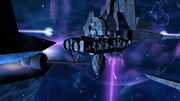 Sunderland Research Station |
- Location: C/4
- Class: Zeus
- Gravity: Complete
- Docking: Yes
- Amenities: Yes
- Population: 1,4K
|
|
- Location: C/3
- Class: Dundee
- Gravity: Complete
- Docking: Yes
- Amenities: Yes
- Population: 800
|
|
- Location: E/4
- Class: Loch Linnhe
- Gravity: Partial
- Docking: Yes
- Amenities: Yes
- Population: 1,4K
|
|
- Location: H/2
- Class: Victoria
- Crew: CLASSIFIED
- Armament: CLASSIFIED
|
|
- South Shields Refinery is a huge manufacturing complex orbiting the planet Hartlepool. The Independent Miners Guild was the first to discover the Newcastle system, in mid 588 A.S., and constructed South Shields in 590 A.S., when Bretonian corporations were only just starting to explore Newcastle and evaluate its resources. The refinery mainly purifies water and oxygen from the nearby Galloway Ice Cloud, seperating the hydrocarbon impurities, but it also manufactures a small amount of Deuterium and H-Fuel, using resources mined from the atmosphere of Hartlepool.
- Location: F/2
- Class: Loch Ness
- Gravity: Complete
- Docking: Yes
- Amenities: Yes
- Population: 600
|
|
- Location: D/2
- Class: Unknown
- Gravity: Complete
- Docking: Yes
- Amenities: Yes
- Population: Unknown
|
|
- Location: G/5
- Class: Unknown
- Gravity: Complete
- Docking: Yes
- Amenities: Unknown
- Population: Unknown
|
|
- Belfast has had a grim and bitter past. Built in 776 A.S., the facility has been mining resources from the crust of the nearby planet Middlesbrough. The Mollys didn't take too kindly to the new trade lane and manufacturing base infringing on their territory, especially with it dangerously close to Mull Base, and started launching attacks against it. Molly agents secretly started applying for and receiving jobs aboard Belfast, ready for the day when they would claim it for their own.
- Location: F/5
- Class: Unknown
- Gravity: Complete
- Docking: Yes
- Amenities: No
- Population: Unknown
|
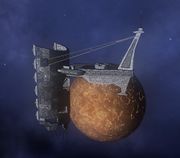 Belfast Production Facility |
- Location: E/6
- Class: Unknown
- Gravity: Complete
- Docking: Yes
- Amenities: Yes
- Population: Unknown
|
|
- Location: B/4
- Class: Sekigahara
- Crew: CLASSIFIED
- Armament: CLASSIFIED
|
|
- Location: C/4
- Class: Dunkirk
- Crew: CLASSIFIED
- Armament: CLASSIFIED
|
|
Mineable Commodities
- Dihydrogen monoxide (H2O) is odorless, tasteless, transparent, and absolutely essential to human life. Roughly 75% of the human body is composed of Water. Deprived of Water, most humans can only live three days. The process of dehydration is a painful one, as tissues shrivel and vessels shrink in a desperate bid by the dying body to preserve its remaining vital functions.
|
Error creating thumbnail: Unable to save thumbnail to destination |


